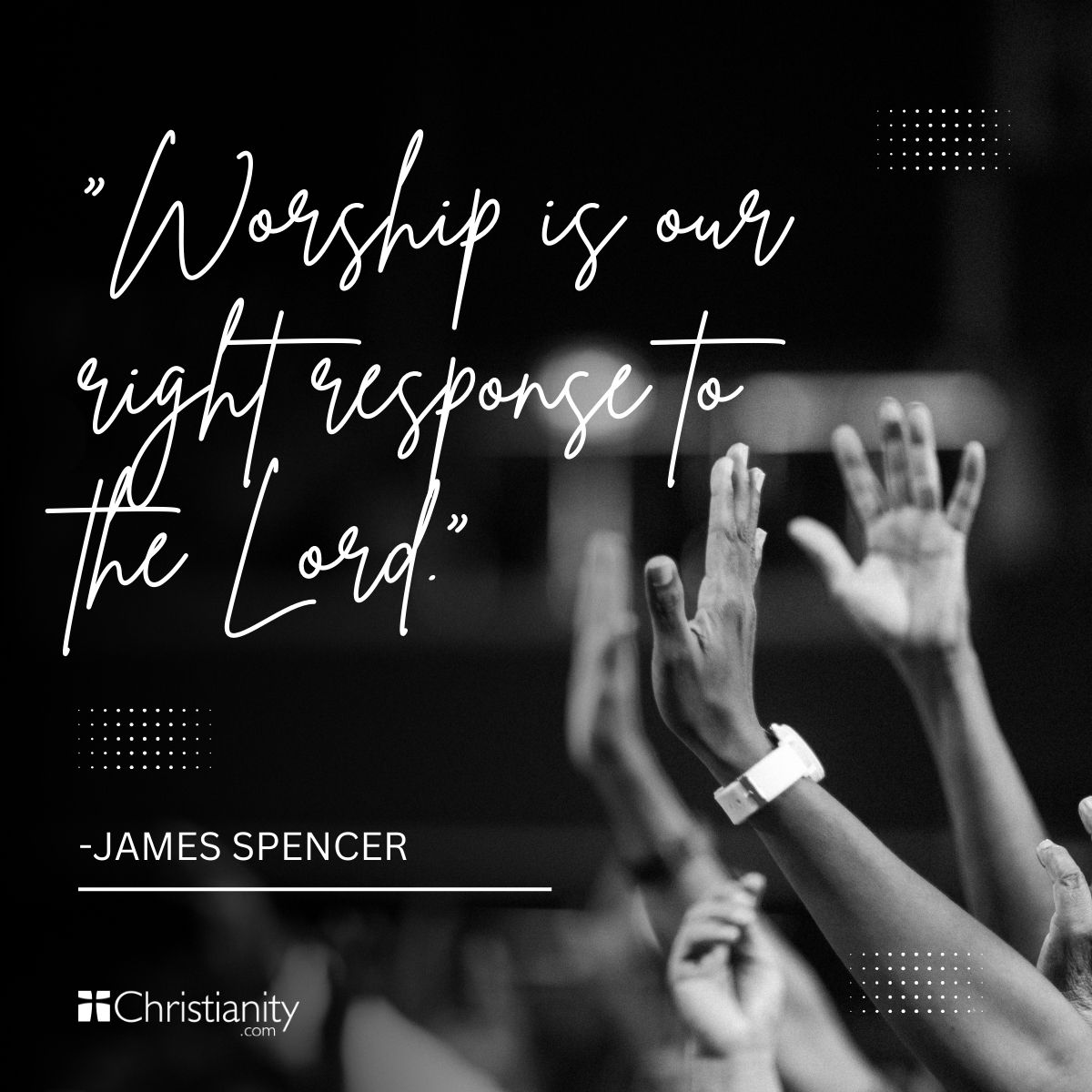As a young married couple, my wife and I attended a megachurch in the Chicagoland area. The worship band performed primarily praise choruses. During what seemed like the nineteenth round of “I Could Sing of Your Love Forever,” I leaned over to my wife and said, “I can’t sing of God’s love forever.” She elbowed me, rolled her eyes, and went back to worship while I stood next to her, hoping that the band would, at some point, shift to a new chorus.
I’m not opposed to singing. Over time, I’ve come to enjoy singing during worship. The story, however, illustrates one of the ways that I became distracted in worship. I’ve always been a bit more interested in studying than singing, so repeating the same line over and over again is (I hate to admit) frustrating for me. I become impatient. That isn’t the song’s fault or the worship leaders’ fault. They aren’t responsible for my disposition. I need to come ready to worship even when the songs we sing may not fit with my personal preferences.
How might the style of worship and the ways we have arranged our churches distract us from paying attention to God? We may be singing, but are we worshiping? Have we become more obsessed with creating a particular experience than with experiencing God? Different people would likely offer different answers to these questions. Still, we need to be asking them not because we want our church to switch from praise choruses to hymns but because we want to give God his due. He is worthy of our worship.
What Is Worship?
In Serpents and Doves, I suggest, “Worship is a response. That response is rooted in our perception of the world. As such, worship can be detached from reality, particularly the reality of God. God’s existence does not have to be denied for worship to be detached from reality.” Let me unpack this a bit. First, worship requires attention…. specifically, it requires us to pay attention to God.
Second, because worship is a response, particularly a response to God, when we aren’t attending to God or if God sits in the background instead of the foreground, it is less likely (if not impossible). When responding to something other than God, we give God his due attention. We are, in some sense, neglecting worship, which, as Old Testament scholar Daniel Block suggests, “involves reverential human acts of submission and homage before the divine Sovereign in response to his gracious revelation of himself and in accord with his will.”
As such, we can believe all the right things about God and still miss the reality of God by pursuing our own interests, ambitions, preferences, and fears. Consider, for instance, 1 Samuel 15. Saul fails to obey God (obedience is an act of worship) not because he is arrogant or obstinate but because he is swayed by the voice of the people (15:21). Instead of following God’s instructions, he decides to listen to the people because he is afraid to oppose them (15:24). Saul misses an opportunity to worship because he attends to the people rather than attending to God.
Worship is our right response to the Lord. It is our way of giving God the glory due to him. When we live in light of reality, particularly the reality of God, we will recognize that God is infinitely more relevant than any other actor or factor we may encounter. We cannot ignore the situations in which we find ourselves, but by adopting a posture of worship, we can respond to God from within those situations. Responding to God will shape the way we behave in a given circumstance.

Again, consider 1 Samuel. David, in contrast to Saul, is not afraid of his people. When Saul enters a cave where David and his men are hiding, David’s men encourage him to kill Saul, thinking that the Lord has given Saul over to David (1 Sam 24:4). David, however, only cuts a corner off Saul’s robe and then feels guilty for doing that (24:4-5). His deep respect for the Lord and his anointing keeps him from harming Saul (24:6-7, 10).
Though he has ample reason for distraction, David recognizes that respecting the Lord and his anointed is more important than ending his time on the run. By attending to God, he can respond faithfully within a difficult situation. To return to Block’s description of worship, David’s action “involves reverential human acts of submission and homage before the divine Sovereign in response to his gracious revelation of himself and in accord with his will.” As such, we may see David’s restraint as an act of worship.
The Context of Modern-Day Worship Expressed in Singing
With the description of worship offered above in mind, we may now turn to the question of our modern-day worship in singing. It is worth thinking about the ways that modern-day worship may inadvertently draw our attention away from God, not because we wish to demonstrate that modern-day worship is “bad” but because we desire to worship God well. We want to make sure that when we sing praises, we are being drawn into God’s presence.
When thinking about worship in singing, the conversation often turns to music styles. We tend to compare, for example, hymns and praise choruses. In contrast to praise choruses, which often tend to be relatively “pithy,” hymns tend to offer a more robust theology (though it would be a mistake to think that many contemporary songs do not also have deep theological content). As the book of Proverbs demonstrates, there is nothing wrong with “pithy.” Not everything needs to be a theological treatise. Since I’m quite sure we could find theological errors in both praise choruses and hymns, we may simply say that we should be discerning and thoughtful about the songs we sing. We want them to reflect reality. As such, it isn’t a matter of traditional vs. contemporary but of discerning the theological content of the songs regardless of era.
If we assume that theologically accurate lyrics are more important than music styles, we can move on from individual song choices to the context of our worship in singing. That context creates certain constraints. Some constraints, as Alicia Juarrero has suggested, constraints allow some behaviors to emerge while limiting others. If, as she argues, context matters, we can think through the various aspects of that context to consider how they might, if we aren’t diligent and intentional about focusing on God, lead us to pay more attention to the band, the lights, or even the beat of the music than to God.
Growing up, I attended a Missouri Synod Lutheran church. I remember walking into the nave where the congregation sat and having my eyes drawn to the chancel where the altar, pulpit, cross, and stained glass picturing a crown of thorns and another cross were prominently featured. Aside from a small piano up front used occasionally, the organ and choir were situated above and behind the congregation. As we sang, we faced the chancel. The goal of the design was to focus the congregation on God as revealed in the word and sacrament. It symbolized a movement journey from the ordinary world and into God’s presence.
Unlike the Lutheran church I attended growing up, the non-denominational churches I’ve attended generally have a cross somewhere at the front, along with the pulpit. While they don’t generally retain the distinctive spaces of the nave and chancel, the stage is clearly a focal point. The band plays from the stage as the words to the worship song are displayed on large screens in the front of the church. The arrangement isn’t necessarily problematic, but it may be less theologically intentional. In other words, whereas the Lutheran arrangement seeks to convey a specific theological message, the non-denominational arrangement is more pragmatic.
I would be the first to admit that the significance of these architectural features was largely lost on me. I didn’t come to appreciate them until I was older and had attended several non-denomination churches whose worship was far different than the relatively simple and formal style I’d grown up with. While I’ll compare the Lutheran church context to the non-denominational churches I’ve attended, it is important to remember that context is important but not everything.
We need to approach God with a posture of worship regardless of the context because no worship experience is sufficient to ensure that our hearts are prepared to worship the Lord.
Still, it is interesting to consider how the context of a non-denominational church might influence those who are worshipping. First, by positioning the band up front with lights, smoke machines, and other concert-like elements, there could be a tendency to get caught up in the experience and lose sight of God. We need to make sure that we aren’t just singing but worshiping. There is a difference, and it is largely internal…it is a matter of the heart.
Second, with the elimination of hymnals, songs need to be conducive to fitting on a screen. While that doesn’t necessarily preclude the use of hymns, it seems to make it a bit less likely. As such, worship in singing becomes a stream of shorter praise choruses. As I noted previously, so long as the music is theologically accurate and points to reality, there isn’t a wrong “style.” However, just as the Lutheran service I attended was 100% dependent on hymnals and, thus, hymns, the screens up front tend to create a limitation. It is worth thinking about how a stream of praise choruses narrows the scope of our reflection on God.
Finally, unlike an organist or singers in a choir, those leading worship today can become quasi-celebrities. Again, we need to acknowledge that this is not a problem unique to modern worship. Our propensity to create celebrities or “sages on stages” is not new. The question, however, is whether and how our modern worship accentuates that propensity. While we should not deny people the opportunity to display their God-given talents, the production of many worship services creates something of a spectacle that focuses our attention on the stage and those on it rather than on God. We could likely say something similar for preachers in many churches. When the people become the focal point, we can be sure that we have stopped worshipping God.
Again, I am not advocating for a return to more traditional forms of worship. While the traditional forms have certain strengths, contemporary worship is certainly capable of pointing God’s people to the Lord and guiding them to glorify Him. The “right” way to worship is “in spirit and truth” (Jn 4:24).
The place and style, however, can create challenges for worshiping “in spirit and truth.” As such, we need to be aware that we may find ourselves more enamored with the worship music, the worship leaders, or the production than we are with God. Our desire should not be to see a good show on Sunday morning but to praise the Triune God. To praise the Triune God, we need to be aware of the ways the environment in which we sing may draw our attention away from God instead of directing it toward Him.
Photo Credit: ©David Clark/SparrowStock





